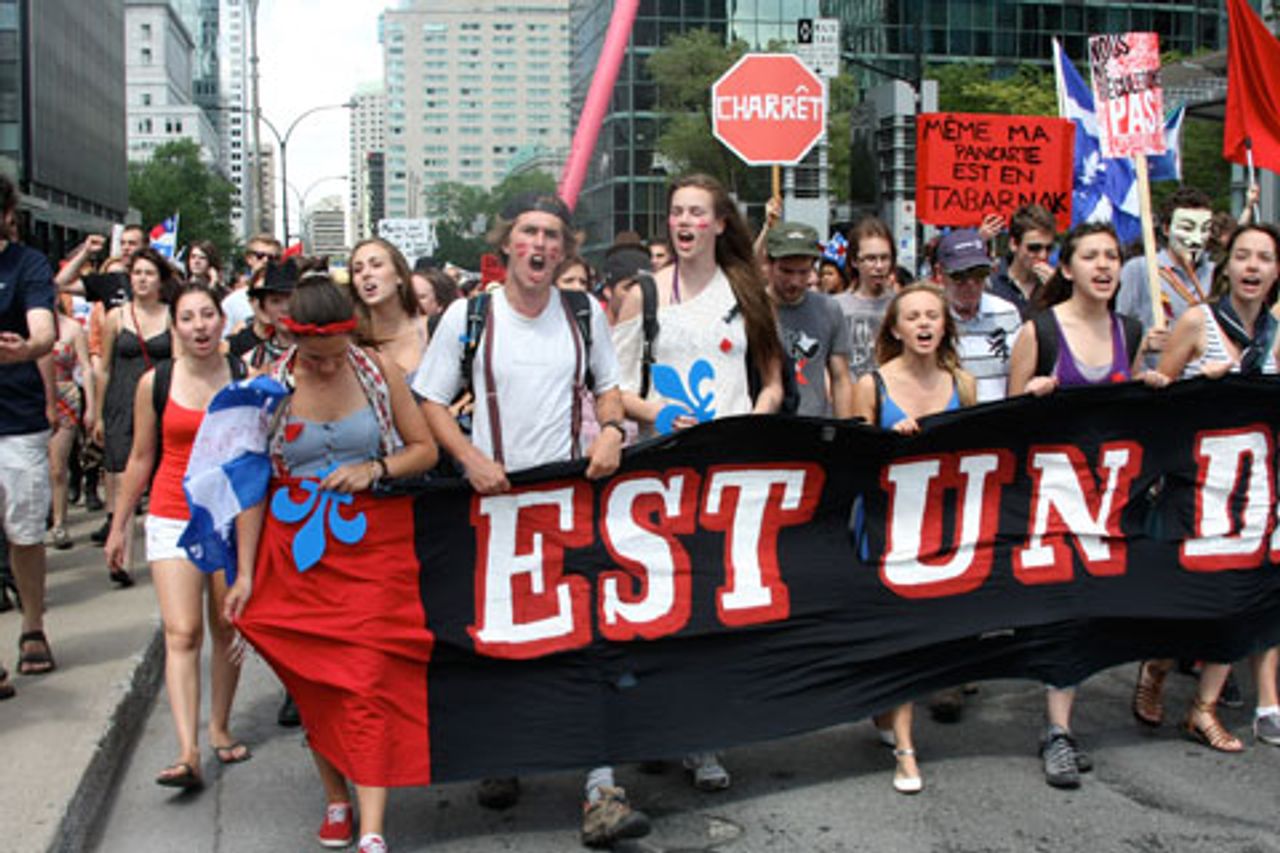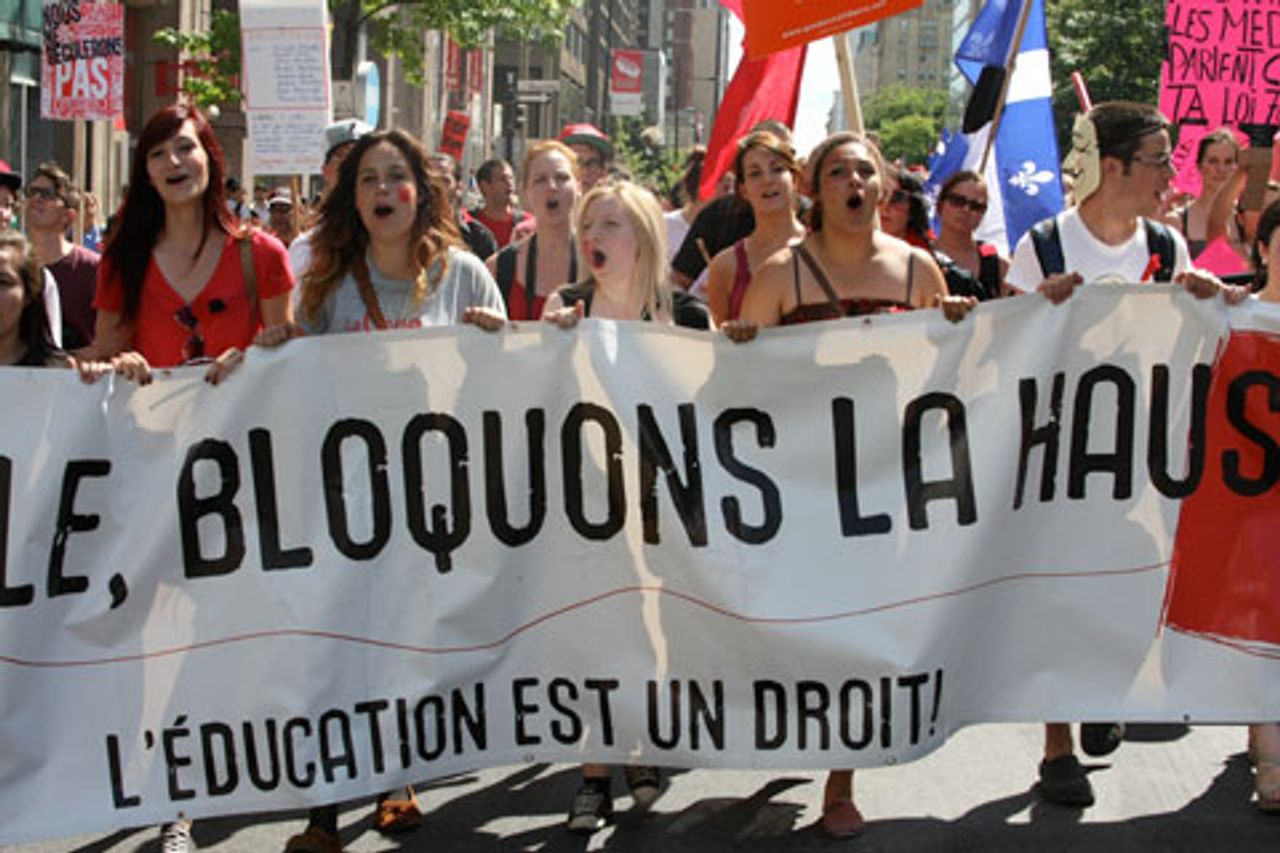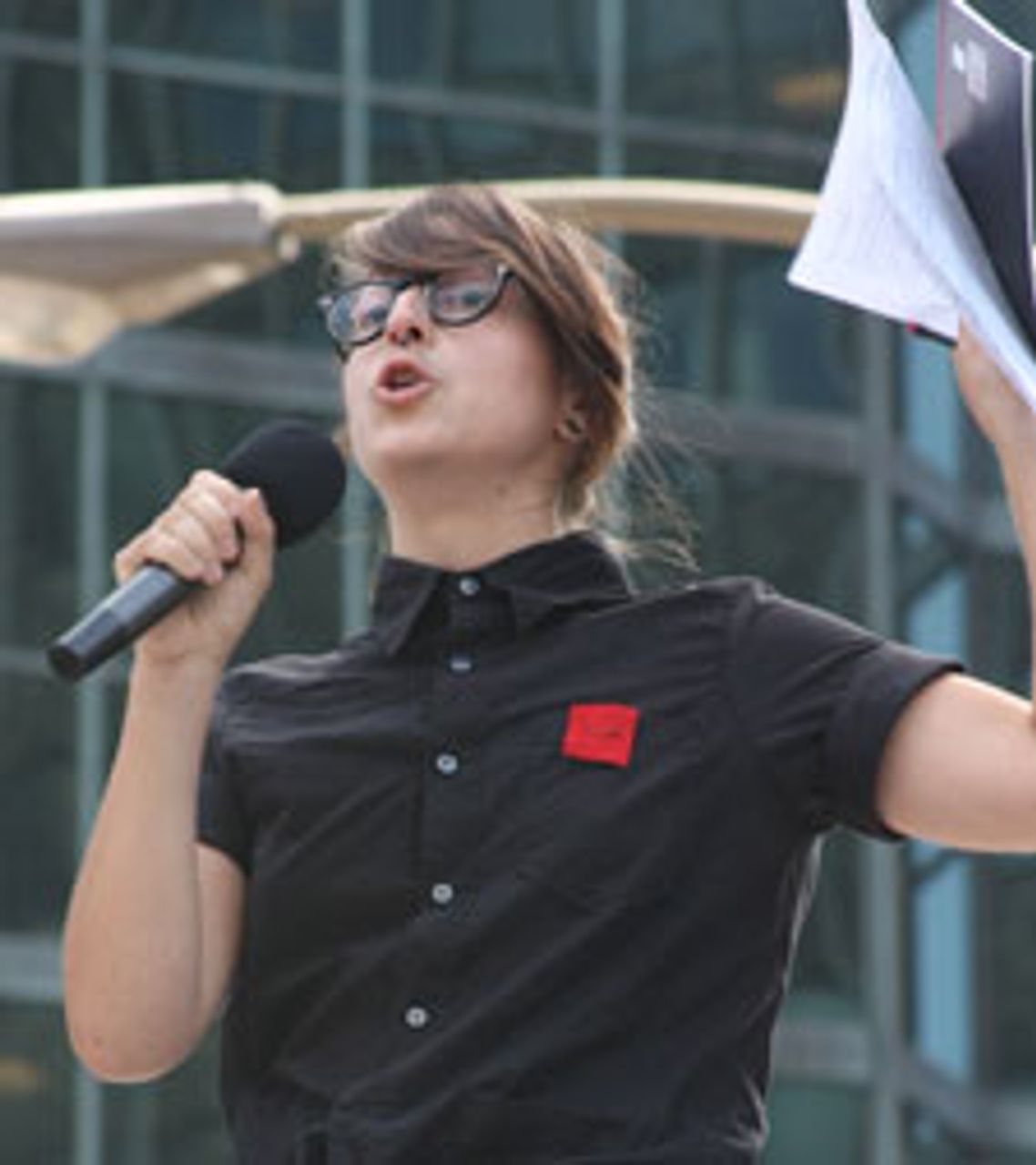 Part of the march in Montreal
Part of the march in MontrealTens of thousands took to the streets of Montreal and Quebec City yesterday to support the four-month-long student strike against an 82 percent increase in university tuition fees and oppose the right-wing provincial Liberal government of Jean Charest.
According to the Quebec City daily Le Soleil, Quebec’s capital yesterday witnessed its largest demonstration since the strike began. Organizers of the Montreal march put the crowd in the order of 100,000 people.
The large turnouts attest to the government’s failure to break the strike despite an unprecedented campaign of police violence and the adoption of Bill 78—legislation that criminalizes the student strike and places sweeping restrictions on the right to demonstrate in Quebec over any issue.
The awareness that the tenacity and militancy of the strike and the groundswell of opposition to Bill 78 has rocked the government and Quebec establishment contributed to a spirit of festive defiance.
 Demonstrators in the march
Demonstrators in the marchThe size and composition of the demonstrations also underscore that the strike itself has become part of a wider social movement in opposition to the big business Liberal government.
Large numbers of workers and retirees joined the Montreal demonstration, although there were only a handful of official union delegations and these were quite small.
The unions claim to support the students and have denounced Bill 78. However, they have worked systematically to isolate the strike. No sooner did Bill 78 become law than the unions declared they would obey it, including provisions that legally compel them to do everything in their power to ensure that teachers and other union members assist the government in breaking the strike.
The unions, and the two student associations most directly under their influence and patronage, FECQ (Quebec College Students’ Federation) and FEUQ (Quebec University Students’ Federation), are openly seeking to divert the student strike behind the election of a Parti Quebecois (PQ) government. The Quebec bourgeoisie’s alternate party of government, the PQ imposed the greatest social spending cuts in Quebec history when it last held power.
Speaking Friday, FEUQ President Martin Desjardins declared, “The youth will change the face of Quebec in the next few years and will be called upon to mobilize massively at the next election.”
In recent weeks, spokesmen for CLASSE (The Broader Coalition of the Association for Student-Union Solidarity), the student association that initiated the strike movement last February, have spoken of the need for a “social strike,” in which the unions would play a central role in a wider opposition movement directed against other elements of the Charest government’s austerity program.
But the unions have rejected this out of hand. Confederation of National Trade Unions President Louis Roy has publicly rubbished the idea of a “social strike,” and the province’s largest labour federation, the Quebec Federation of Labour, has proclaimed its central slogan “After the streets, to the ballot box.”
The unions’ vehement opposition to even limited job action against the Charest government was driven home by their effective boycott of yesterday’s demonstration in Montreal, which was organized principally by CLASSE.
 Yvonne Saulnier, of "Profs contre l'hausse"
Yvonne Saulnier, of "Profs contre l'hausse"(Teachers Against the Fee Hike)
CLASSE, for its part, did not seek to use the demonstration and the presence of tens of thousands of youth and workers, many of them actively looking for a means to broaden the struggle, to raise its call for a “social strike.”
Speaking at the pre-march rally, Yvonne Saulnier of Profs contre l’hausse (Teachers against the fee hike) denounced the government’s “user-pay” principle for public services and the dismantling of public education. “We refuse to accept,” said Saulnier, “that the business model is the only acceptable model for education and society. The university is not an enterprise and the more we fight the more we will stop it from becoming one.”
 Arnaud Thierry-Cloutier, a Université de
Arnaud Thierry-Cloutier, a Université deMontréal student and CLASSE member
Arnaud Thierry-Cloutier, a Université de Montréal student and CLASSE member, said that at the time of the huge March 22 demonstration the idea of a “Maple Spring” was a “wish.” “Then came Bill 78 and the casseroles (pots and pans protest) movement and it became a reality with masses of people responding to our call for solidarity. Never has our movement had less support in the opinion polls and never has it been more implanted in the streets.”
The crowd cheered loudly whenever Thierry-Cloutier condemned big business. He charged the ruling elite with seeking to “create richness at any price” and of “managing a state like one manages a Wal-Mart.”
Responding to the media’s denunciations of the students as “selfish” and mounting a “corporatist” struggle (i.e., one just for their group), Thierry-Cloutier observed that the strike had already cost most students more than the extra they would have to pay should the full 82 percent tuition fee hike increase be imposed. “The ones who always act in their self-interest and only their self-interest are the big businesses. They are the biggest corporatists in Quebec.”
“This,” he continued, “is not a strike for students’ interests. It is for the redistribution of wealth and now for revitalizing democracy.”
Neither Saulnier nor Thierry-Cloutier made any reference to the big business PQ and the campaign of the unions to divert the student strike behind the campaign to elect a PQ government. Nor did they point to the austerity measures being imposed by the federal Conservative government or those being imposed by capitalist governments around the world, let alone call for a united struggle against them.
Supporters of the Socialist Equality Party distributed more than 2,000 copies of a statement advancing a socialist program. It argued that if students are to prevail in their struggle to make education a social right, the strike must become the catalyst for a cross-Canada working class counter-offensive aimed at bringing down the Charest and Harper Conservative governments and developing an independent political movement of the working class to break the power of big business over socio-economic life through the establishment of workers’ governments committed to socialist policies.
The full statement can be read here: “The way forward for the Quebec student strike”.
